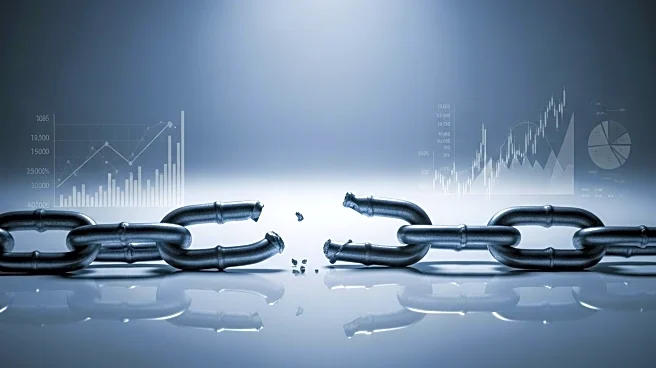What's Happening?
Auto loan debt in the United States has reached $1.66 trillion, with delinquencies, defaults, and repossessions on the rise. The Consumer Federation of America (CFA) has released a report titled 'Driven to Default: The Economy-Wide Risks of Rising Auto Loan Delinquencies,' highlighting the severity of the situation. The report criticizes Congress and federal watchdogs for not taking sufficient action to protect consumers from potentially exploitative practices by auto dealers. High monthly payments, partly due to elevated interest rates, are contributing to the financial strain on car owners. The typical monthly payment is $745, with 20% of buyers facing bills of at least $1,000. The situation is exacerbated by the impending expiration of the $7,500 EV tax credit. Notably, even borrowers with above-average credit scores are experiencing increased difficulty in meeting payment obligations, with repossession rates rising significantly across all age groups.
Why It's Important?
The surge in auto loan delinquencies poses a significant threat to the U.S. economy, reminiscent of the conditions preceding the 2008 financial crisis. The CFA warns that prioritizing car payments over other household expenses could indicate broader economic distress. This situation could lead to increased financial instability for many Americans, affecting consumer spending and overall economic health. The report calls for policymakers to scrutinize the auto lending market and address exploitative practices that inflate costs for consumers. The potential disappearance of the EV tax credit could further strain buyers, particularly those relying on incentives to afford electric vehicles. The broader impact includes potential shifts in consumer behavior, reduced demand for new vehicles, and increased pressure on financial institutions managing auto loans.
What's Next?
The CFA suggests that now is the time for policymakers to intervene in the auto lending market to prevent exploitative practices and protect consumers. This could involve legislative action or increased regulatory oversight to ensure fair lending practices. As the situation develops, stakeholders such as auto manufacturers, financial institutions, and consumer advocacy groups may push for reforms to stabilize the market. Additionally, consumers may need to reassess their purchasing decisions, potentially opting for more affordable vehicles or reconsidering financing options. The expiration of the EV tax credit could prompt discussions on alternative incentives to support the transition to electric vehicles.
Beyond the Headlines
The rising auto loan defaults highlight ethical concerns regarding consumer protection and the responsibility of lenders to offer fair terms. The situation underscores the need for financial literacy and awareness among consumers to make informed decisions about auto financing. Long-term implications may include shifts in the auto industry, with manufacturers potentially adjusting pricing strategies or offering more flexible financing options to accommodate changing consumer needs. The crisis also raises questions about the sustainability of current lending practices and the role of government in ensuring economic stability.










